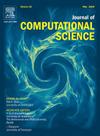Efficient relaxation scheme for the SIR and related compartmental models
IF 3.1
3区 计算机科学
Q2 COMPUTER SCIENCE, INTERDISCIPLINARY APPLICATIONS
引用次数: 0
Abstract
In this paper, we introduce a novel numerical approach for approximating the Susceptible–Infectious–Recovered (SIR) model in epidemiology. Our method enhances the existing linearization procedure by incorporating a suitable relaxation term to tackle the transcendental equation of nonlinear type. Developed within the continuous framework, our relaxation method is explicit and easy to implement, relying on a sequence of linear differential equations. This approach yields accurate approximations in both discrete and analytical forms. Through rigorous analysis, we prove that, with an appropriate choice of the relaxation parameter, our numerical scheme is non-negativity-preserving; moreover, it is strongly convergent to the true solution. We also extend the applicability of our relaxation method to handle some variations of the traditional SIR model. Finally, we present numerical examples using simulated data to demonstrate the effectiveness of our proposed method.
SIR和相关室室模型的有效松弛方案
本文介绍了一种近似流行病学中易感-感染-恢复(SIR)模型的新颖数值方法。我们的方法通过加入合适的松弛项来处理非线性型超越方程,从而改进了现有的线性化过程。在连续框架内开发,我们的松弛方法是明确的,易于实现,依赖于一系列线性微分方程。这种方法在离散形式和解析形式中都能得到精确的近似。通过严密的分析,我们证明了在适当选择松弛参数的情况下,我们的数值格式是非负保持的;而且,它是强收敛于真解的。我们还扩展了松弛方法的适用性,以处理传统SIR模型的一些变化。最后,我们用模拟数据给出了数值例子来证明我们所提出的方法的有效性。
本文章由计算机程序翻译,如有差异,请以英文原文为准。
求助全文
约1分钟内获得全文
求助全文
来源期刊

Journal of Computational Science
COMPUTER SCIENCE, INTERDISCIPLINARY APPLICATIONS-COMPUTER SCIENCE, THEORY & METHODS
CiteScore
5.50
自引率
3.00%
发文量
227
审稿时长
41 days
期刊介绍:
Computational Science is a rapidly growing multi- and interdisciplinary field that uses advanced computing and data analysis to understand and solve complex problems. It has reached a level of predictive capability that now firmly complements the traditional pillars of experimentation and theory.
The recent advances in experimental techniques such as detectors, on-line sensor networks and high-resolution imaging techniques, have opened up new windows into physical and biological processes at many levels of detail. The resulting data explosion allows for detailed data driven modeling and simulation.
This new discipline in science combines computational thinking, modern computational methods, devices and collateral technologies to address problems far beyond the scope of traditional numerical methods.
Computational science typically unifies three distinct elements:
• Modeling, Algorithms and Simulations (e.g. numerical and non-numerical, discrete and continuous);
• Software developed to solve science (e.g., biological, physical, and social), engineering, medicine, and humanities problems;
• Computer and information science that develops and optimizes the advanced system hardware, software, networking, and data management components (e.g. problem solving environments).
 求助内容:
求助内容: 应助结果提醒方式:
应助结果提醒方式:


